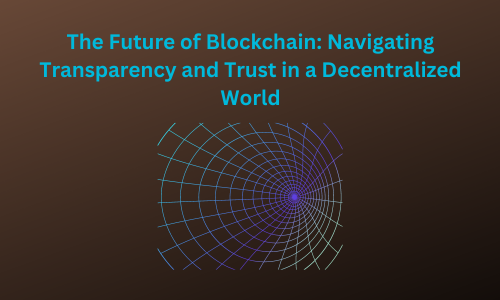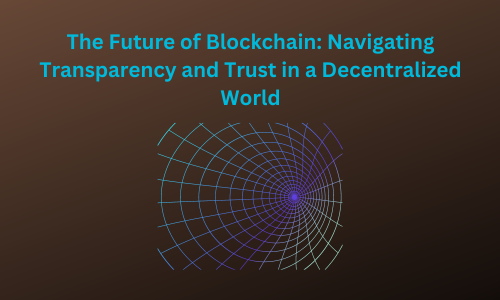


In a world increasingly defined by digital interactions, blockchain technology has emerged as a revolutionary force, promising a new era of transparency and trust. As we look ahead, the decentralized blockchain space is poised to evolve in ways that could reshape industries, redefine governance, and transform our understanding of trust itself.
Blockchain technology is built on the principles of transparency and trust. In public blockchains, every transaction is recorded on a distributed ledger, visible to all participants. This openness eliminates the need for intermediaries, allowing for trustless transactions—where trust is established not by third parties but by the technology itself.
Smart contracts have further enhanced transparency. These self-executing contracts automate agreements when predefined conditions are met, ensuring that all parties adhere to the terms without manual oversight. In the realm of Decentralized Finance (DeFi), these contracts are already enabling a trustless financial ecosystem, where users can lend, borrow, and trade assets without relying on traditional financial institutions.
However, the current blockchain landscape is not without its challenges. The transparency of public blockchains, while advantageous, also raises concerns about privacy. Moreover, the potential for hacks and the lack of regulatory oversight can undermine trust. As we move forward, addressing these challenges will be crucial for the continued growth of blockchain technology.
One of the most exciting developments in the blockchain space is the advent of Zero-Knowledge Proofs (ZKPs). ZKPs offer a solution to the privacy dilemma by allowing users to prove the truth of a statement without revealing the underlying data. This technology could enable blockchains to maintain transparency while safeguarding sensitive information, striking a balance that has long been sought after.
Interoperability is another key trend that will shape the future of blockchain transparency. As more blockchains emerge, the ability to communicate and share data across different networks will become increasingly important. Enhanced interoperability could lead to greater transparency across the entire ecosystem, making it easier for users to track assets and transactions across multiple platforms.
Governance models are also evolving. Decentralized Autonomous Organizations (DAOs) are pioneering new forms of governance that prioritize transparency and community involvement. These models allow stakeholders to participate in decision-making processes, ensuring that governance is not concentrated in the hands of a few but is distributed among all participants.
As the blockchain space matures, trust will continue to be a cornerstone of its development. Enhanced security protocols, such as quantum-resistant algorithms, are on the horizon, promising to protect blockchain networks from the emerging threat of quantum computing. These advancements will be critical in maintaining the integrity of decentralized systems.
Regulation will also play a significant role in building trust. While blockchain advocates often emphasize the importance of decentralization, regulatory frameworks can provide a level of oversight that reassures users. The challenge will be to implement regulation in a way that preserves the decentralized nature of blockchain while ensuring compliance and security.
Decentralized reputation systems represent another promising avenue for building trust. By allowing users to build and verify reputations on blockchain networks, these systems can help establish trust between parties who may never meet in person. This could be particularly valuable in sectors like e-commerce, where trust is essential for transactions.
Artificial Intelligence (AI) and Machine Learning (ML) are set to play an increasingly important role in the blockchain space. Predictive analytics powered by AI can help identify and prevent fraudulent activities, enhancing trust in blockchain transactions. Additionally, AI can assist in real-time data verification, ensuring that information recorded on the blockchain is accurate and reliable.
The combination of AI and blockchain could lead to new levels of automation and security, making decentralized systems more robust and trustworthy. However, the integration of AI also raises questions about control and centralization, which will need to be carefully managed to maintain the decentralized ethos of blockchain technology.
Despite the potential of blockchain, several challenges remain that could impact its future. Scalability is a significant issue; as blockchain networks grow, the demand for processing power and storage increases. Finding solutions that allow blockchains to scale without compromising speed or security will be essential for their continued success.
Energy consumption is another concern, particularly with Proof-of-Work (PoW) blockchains like Bitcoin. These systems require massive amounts of energy, raising environmental and sustainability issues. As the world becomes more conscious of conserving energy, finding more energy-efficient consensus mechanisms, such as Proof-of-Stake (PoS), will be crucial.
Finally, there is the paradox of centralization within decentralized systems. While blockchains are designed to be decentralized, certain aspects, such as mining pools or governance control, can lead to centralization. Addressing these risks will be key to preserving the trust and transparency that blockchain promises.
As we envision the future of blockchain, it's important to look at real-world examples of how this technology is already transforming industries. In supply chain management, companies are using blockchain to track goods from origin to consumer, providing transparency and ensuring the authenticity of products. In finance, blockchain is enabling faster, cheaper cross-border payments, bringing financial services to the unbanked.
Emerging projects in areas like digital identity, healthcare, and voting systems are also pushing the boundaries of what blockchain can achieve. These use cases demonstrate the potential of blockchain to create more transparent, trustworthy systems across various sectors.
The future of the decentralized blockchain space is filled with promise. As technology advances, we can expect to see new solutions that enhance transparency, bolster trust, and overcome existing challenges. From Zero-Knowledge Proofs and AI-driven security to decentralized governance and reputation systems, the tools are being developed to create a more transparent and trustworthy digital world.
However, the journey is not without its hurdles. Scalability, energy consumption, and the risk of centralization are significant challenges that must be addressed. But with innovation and careful governance, the blockchain space can fulfil its promise of a decentralized future, where transparency and trust are not just ideals but realities.
As we move forward, it's crucial for all stakeholders—developers, users, regulators, and investors—to stay engaged and informed. The future of blockchain is being written today, and its success will depend on the collective effort to build systems that are as transparent as they are trustworthy.
Disclaimer: This article is provided for informational purposes only. It is not offered or intended to be used as legal, tax, investment, financial, or other advice.
